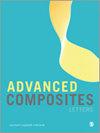Instability analysis of a filament-wound composite tube subjected to compression/bending
IF 2.1
4区 材料科学
Q3 MATERIALS SCIENCE, COMPOSITES
引用次数: 0
Abstract
The aim of this study is to investigate the global buckling of a relatively long composite cord–rubber tube subjected to axial compression and its cross-sectional instability due to bending by a macromechanical nonlinear finite element (FE) model (nonlinear buckling analysis). Composite reinforcement layers are modelled as transversely isotropic ones, while elastomer liners are described by a hyperelastic material model that assumes incompressibility. Force–displacement, equivalent strain, equivalent stress results along with oblateness and curvature results for the complete process have been presented. It is justified that bending leads to ovalization of the cross section and results in a loss of the load-carrying capacity of the tube. Strain states in reinforcement layers have been presented, which imply that the probable failure modes of the reinforcement layers are both delamination and yarn-matrix debonding. There is a significant increase in strains due to cross-sectional instability, which proves that the effect of cross-sectional instability on material behaviour of the tube is crucial. A parametric analysis has been performed to investigate the effect of the member slenderness ratio on cross-sectional instability of the composite tube. It shows that Brazier force is inversely proportional to the slenderness ratio. It further shows that higher oblateness parameters occur in case of a lower slenderness ratio and that cross-sectional instability takes place at a lower dimensionless displacement in case of a lower slenderness ratio. FE results have been validated by a compression/bending test experiment conducted on a tensile test machine.纤维缠绕复合材料管压缩弯曲失稳分析
本研究的目的是通过宏观力学非线性有限元(FE)模型(非线性屈曲分析)研究相对较长的复合材料帘线-橡胶管在轴向压缩下的整体屈曲及其因弯曲而引起的横截面失稳。复合材料增强层被建模为横向各向同性层,而弹性体衬里则被描述为假设不可压缩性的超弹性材料模型。给出了完整过程的力-位移、等效应变、等效应力结果以及扁率和曲率结果。有理由认为,弯曲会导致横截面椭圆化,并导致管道承载能力的损失。给出了补强层的应变状态,表明补强层可能的失效模式为分层和纱线基体脱粘。由于横截面不稳定性,应变显著增加,这证明横截面不稳定对管道材料性能的影响至关重要。对构件长细比对复合材料管截面失稳的影响进行了参数分析。结果表明,钎焊力与长细比成反比。研究进一步表明,在较低长细比的情况下,会出现较高的扁率参数,而在较低的长细比情况下,截面失稳会在较低无量纲位移下发生。在拉伸试验机上进行的压缩/弯曲试验验证了有限元结果。
本文章由计算机程序翻译,如有差异,请以英文原文为准。
求助全文
约1分钟内获得全文
求助全文
来源期刊

Advanced Composites Letters
工程技术-材料科学:复合
自引率
0.00%
发文量
0
审稿时长
4.2 months
期刊介绍:
Advanced Composites Letters is a peer reviewed, open access journal publishing research which focuses on the field of science and engineering of advanced composite materials or structures.
 求助内容:
求助内容: 应助结果提醒方式:
应助结果提醒方式:


